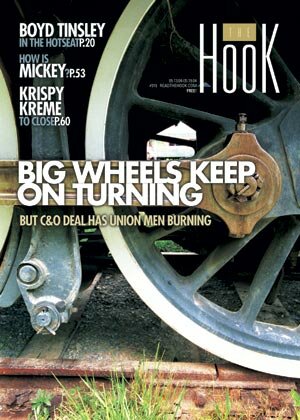More leases: CSX wants to offload routes
Editor's note: CSX made Central Virginia headlines in May with its move to lease about 200 miles of the former C&O– from Clifton Forge through Charlottesville and all the way to Richmond– to a tiny short-line called the Buckingham Branch.
HUNTINGTON, WV– About 250 railroad jobs could be affected by CSX Transportation's decision to invite eight short-line railroads to bid on buying or leasing two major rail routes in West Virginia and western Maryland.
One is a 182-mile east-west route that runs from the New Martinsville area to Cumberland, Maryland, by way of Clarksburg and Grafton. The other is a 116-mile north-south route between Grafton and Cowen.
"These lines require more capital than we are willing to invest, and we hope short-line operators can make their economics operate better than we currently can,'' said CSX spokesman Gary Sease from Jacksonville, Florida. The company did not identify the eight short-line railroads.
In total, about 535 miles could be sold or leased, including redundant main lines, branch lines, yard tracks, and industrial tracks, Sease said.
The short lines were asked to submit bids by July 20, according to Sease.
If a bid is accepted, CSX workers may either relocate to other routes operated by that carrier or apply to the leasing company for work, which could decrease their seniority and pay scales. Also, other CSX jobs could be affected because those who relocate could displace younger workers.
"The company should consider the predicament they're putting these men in,'' said F. S. Furbee, a retired CSX engineer, of Point Pleasant. "They shouldn't be so concerned with making money that they refuse to consider the feelings of the people who have given them so many years of faithful service.''
Retiree Kyle F. Hall of New Smyrna Beach, Florida, whose work used to take him into Huntington, also had concerns.
"Going to work for the other company shouldn't be a choice they have to make,'' Hall said. "They would lose many of their fringe benefits, the security of a large corporation and much of their pay, particularly if the short line uses nonunion labor.''
Hall added that if short lines use older locomotives, "It'll set railroading in that area back probably 20 years.''
Don Menefee, general chairman for the Northern Alliance of the Brotherhood of Locomotive Engineers and Trainmen union, said that if experienced CSX employees choose to relocate, short-line crews may not have the skills required for the routes.
"That's a unique operation,'' he said. "The territory is unforgiving. A mistake might be fatal.''
The two routes involve coal traffic, a mountainous terrain, and tight curves.
But Frank Wilner, spokesman for the United Transportation Union, said the goal is to keep freight on the railroads.
"If the alternative is seeing abandonment of these lines, we would not necessarily oppose such leases if we were convinced that the alternative would be abandonment and scrapping of the rails,'' Wilner said.
As for nonunion labor concerns, Wilner said UTU holds more short-line labor contracts than all other unions combined.
"More than half of all short-line employees today work under union contracts,'' he said.
CSX plans to make a decision within a few weeks of bid submissions, and the company has reserved the right to reject all bids.
The U.S. Surface Transportation Board must approve any operating control changes, said board staff attorney Rudy Saint-Louis.
Overall, CSX wants to cut 1,200 miles from the 23,000-mile, 23-state system this year, Sease said.

The Hook's May 13 cover story covered a proposed sale closer to home.
HOOK ARCHIVE
#